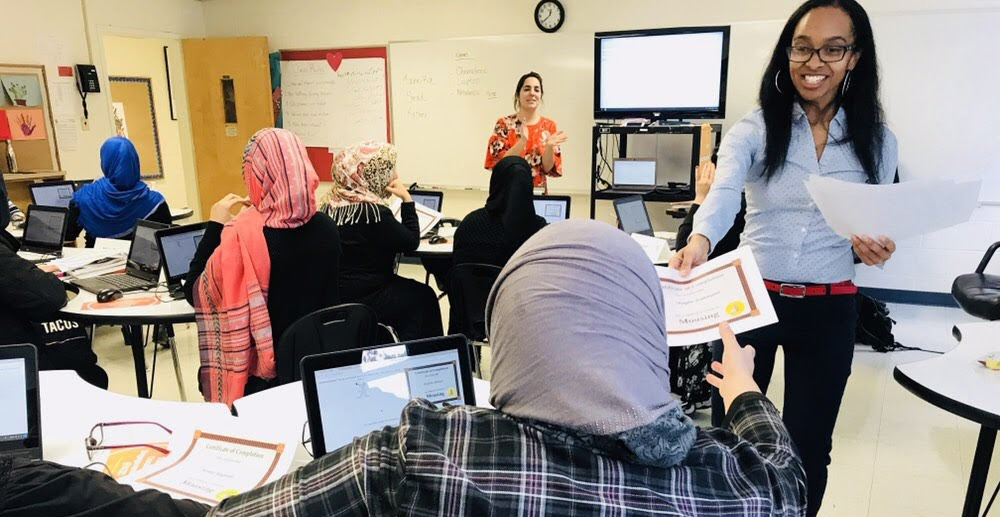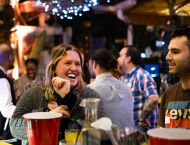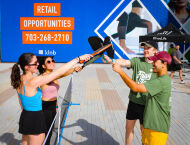Culture
 Photo: Sara Homayouni
Photo: Sara Homayouni
GCRES Educates and Empowers DC-Area Refugees
August 31, 2018 @ 12:00am
David and Lyla Combs experienced one of parenthood’s most significant moments three years ago on September 2, 2015: their son took his first steps. That very same day, however, their joy would be tarnished when they came across the photo of a Syrian toddler, Alan Kurdi, as he lay on a beach near Bodrum, Turkey – one of many deaths to occur during the mass migration of people into Europe due to conflict.
What could have been just another sad story for the Combs to read in the news proved to be the moment they chose to act. The couple began the groundwork for what would soon be the Global Center for Refugee Education and Science (GCRES). Combining David’s background in psychology and Lyla’s in teaching English as a second language, the Combs created a unique system of teaching English to Afghani women refugees who came to the U.S. in hopes of starting over.
When working with those who have been through the unimaginable, it’s no surprise that a GCRES English course is not like a normal language course. In fact, a GCRES English course is not even like other refugee languages classes. Other language training opportunities for refugees are often only two hours a week, according to a University of Sussex study cited on GCRES’s website. GCRES provides a much more intensive experience, with about 30 to 40 hours a week of English classes.
As GCRES Development Officer Sara Homayouni put it, the best way to describe what GCRES does is by telling the story of one of its students. Homa, a young woman in her twenties, was forced to flee Afghanistan with her family a year ago because the Taliban did not like that her father helped the U.S. military. When she found her way to GCRES, she couldn’t even hold a pencil because of her lack of education under Taliban rule. But at the end of a single eight-week course with GCRES, Homa could write basic words and carry on simple conversation in English.
In May of this year, Homa graduated from GCRES’s advanced class with a driving permit and connections to a local daycare that she volunteers with, coming a long way from the young woman who didn’t know how to hold a pencil not that long ago.
Homa’s story, while harrowing to many Americans, is like most of the stories of the students who come through GCRES. The women, who range in age from mid-twenties to mid-forties, arrive in the U.S. on special immigrant visas because they or their families assisted the U.S. Army, the United States Agency for International Development (USAID) or the U.S. Embassy in some form or another. Most arrive speaking no English and are often not even literate in their own language.
When they begin courses with GCRES, students are provided transportation, meals, child care and classroom materials to ease the process of taking classes. A first lesson is usually teaching the students how to navigate being in a classroom – a first for many of the women – like raising a hand to answer a question. They are also paired with translators who act as a go-between, not only as a language translator, but as someone students can relate to.
Homayouni adds that role-playing is a vital portion of the class that incorporates both language and integration lessons. For example, students work through every day scenarios like going to the grocery store. Other lessons happen outside the classroom, like taking the students on field trips to museums, doing volunteer work at a nursing home perhaps or showing them how to navigate the bus system. As Homayouni put it, GCRES’s role is not just about teaching students how to learn English, “[it’s] about making them feel welcome, like they’re a part of the community, and having women like Homa really feel like they can stand on their own.”
But teaching these refugees does more than just benefit the students. It’s important for the surrounding community as well, says Homayouni. Rapid integration leads to refugees requiring less government assistance. They can then help strengthen the economy and improve the communities they are a part of. “Being able to integrate refugees into our communities is celebrating diversity and it encourages it; we open our doors to new food, to new dances, to new ways of thinking, new world views,” Homayouni says. “Broadening our world views is just so important for taking a step outside ourselves and having empathy.”
Homayouni encourages people to help the global refugee crisis in any way they can, but especially by educating themselves about what’s happening outside the U.S. and on immigration. “Refugees are the same as us, but the only thing is they have had to face a hardship and leave their home country. It’s not something that should incite fear in anyone. [Refugees] are just amazing and I think we need to respect how much they’ve gone through, and to be there for them in whatever they may need to feel comfortable here.”
One way GCRES is helping educate the community about the refugees they work with is through their new Fall 2018 event series, a project they have partnered on with Veterans for American Ideals and Human Rights First. Panel discussions will cover a range of topics like African migration to Europe and the Rohingya crisis in Myanmar.
As for what the future holds for the budding GCRES, Homayouni hopes the center will expand from their base in Alexandria, VA to other U.S. cities, and possibly other countries as well.
“Language [is] a key to everything. It’s a key to feeling comfortable in your new environment, it’s a key to feeling part of your new environment and it’s the key to seeing the culture that you are now making your own home,” Homayuni says. “Everything that you see and everything you know, it’s kind of dictated by your language. We feel it’s a very important part of uniting our community.”
For more information on the Global Center for Refugee Education and Science (GCRES) visit them at their website or go to their Facebook page for more information on their fall 2018 event series.







